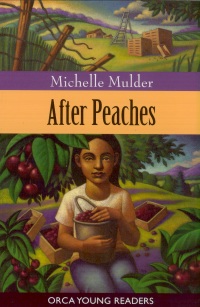| ________________
CM . . . . Volume XVI Number 21. . . .February 5, 2010. 
 |
After Peaches. (Orca Young Readers).
Michelle Mulder.
Victoria, BC: Orca, 2009.
106 pp., pbk., $7.95.
ISBN 978-1-55469-176-0.
Grades 4-6 / Ages 9-11.
Review by Kimberley Siwak & Gregory Bryan.
***/4
|
| |
|

excerpt:
My parents looked at each other. They weren’t disagreeing with me anymore, so I kept talking as fast as I could. “We could travel all the way across, just like you said, Papá. First strawberries and raspberries in the Fraser Valley. Later cherries and peaches on the edge of the desert. We’ll meet all sorts of people and see a million places, and I’ll help you in the fields every day, and after peaches, we’ll be rich! And we can come back here and choose any apartment we want. Maybe even one in the big buildings downtown, with a pool, or a garden on the roof!”
At last they smiled. Mamá even laughed. “I think,” she said, “we’d have to invest in some new furniture if we wanted one of those fancy apartments. They wouldn’t want lawn chairs in their kitchens and children sleeping on sofas.”
She was teasing, of course—and changing the subject—but she looked less worried than she had since we got that letter about the rent going up.
In Michelle Mulder’s short novel, After Peaches, Rosario Ramirez and her parents have relocated to Canada to escape political persecution. In their native home of Mexico, Rosie’s older brother, Ricardo, was killed after speaking out against the government. The Ramirez family then fled to Guatemala before securing sponsorship to immigrate to Canada.
Rosie’s new life at Gerorgison Elementary in Victoria, BC, presents new challenges as she struggles to learn a new language and make new friends. When the class bully, Robbie, teases her for her broken English, Rosie vows not to speak English until the start of the next school year, when she is going to speak “completely fluent Canadian English.” She intends to amaze everybody and leave Robbie speechless.
Rosie’s family spends the summer employed as itinerant workers picking fruit. Given that the summer holidays will separate Rosie from her best friend, Julie Norton, Rosie eagerly constructs a plan where she and her family will pass the summer traveling across British Columbia. Her parents leave their jobs in Victoria tending tulip fields to cross the province picking strawberries, cherries, and finally peaches.
Mulder describes the difficult living conditions encountered by many itinerant workers involved in the Seasonal Agriculture Workers Program—a program that employs Mexican and Caribbean labourers to assist with Canadian fruit harvest. In her author’s note afterword, Mulder explains that not all migrant workers suffer exploitation. For the purposes of her story, the Ramirez family and their friends end up in a treacherous situation where the land owner is less concerned with safety than productivity. While this is not every migrant farmer’s experience, Mulder explains that this situation is the reality in some cases.
Canadians are rightfully proud of Canada’s multicultural ideal. Unfortunately, for some, the ideal is only a glorified section of what can be a larger, nastier, more complex reality. Mulder’s depiction of the Ramirez family’s experience captures the anxiety, uncertainty, and frustration in a way that seems to be authentic. This authenticity extends to the occasional use of Spanish words and phrases. As such, she includes a glossary of terms at the book’s end.
Unfortunately, we feel that Mulder’s choice to craft the protagonist as a 10-year-old is somewhat limiting. Those readers most drawn to a 10-year-old protagonist are likely to find some of the content inaccessible. In increasing Rosie’s age by as little as two or three years, Mulder may have increased her readership and improved the likelihood that her readers would be able successfully navigate the text.
Perhaps the biggest strength of the book is the gritty tone to the text which seems to reflect the grit and grime of working in the fields. Mulder is careful not to speak down to her readers. She is neither condescending, nor does she avoid confronting difficult issues. We think that After Peaches has strong educative potential as a tool for introducing and discussing the experiences of New Canadians. Moreover, the novel is an interesting and engaging read that might better help children to understand the topic and its complexity than the typical type of resources that teachers might otherwise employ.
Recommended.
Kimberley Siwak is a graduate student in literacy education and is currently teaching grade one. Gregory Bryan teaches literacy classes in the Faculty of Education at the University of Manitoba.

To comment on this title or this review, send mail to
cm@umanitoba.ca.
Copyright © the Manitoba Library Association. Reproduction for personal use is permitted only if this copyright notice is maintained. Any other reproduction is prohibited without permission.
NEXT REVIEW |
TABLE OF CONTENTS FOR THIS ISSUE- February 5, 2010.
AUTHORS |
TITLES |
MEDIA REVIEWS |
PROFILES |
BACK ISSUES |
SEARCH |
CMARCHIVE |
HOME |
